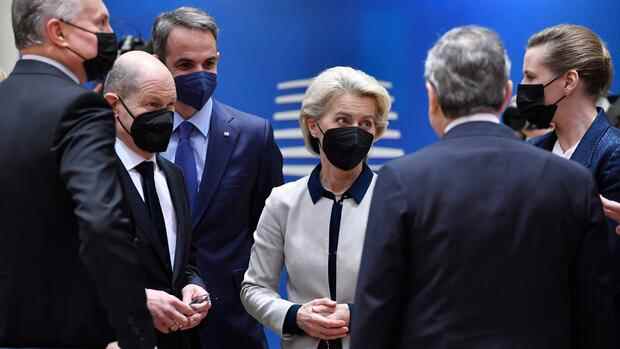Olaf Scholz and Ursula von der Leyen at the special summit of EU heads of state and government on the situation in Ukraine.
(Photo: dpa)
Brussels The greatest strength of the West, it has been said for weeks, is its unity. After the end of the EU summit on Friday night, however, the allies continued to disagree about Russia’s exclusion from the Swift payment system – a sanction that Germany does not want to support.
The German Chancellor Olaf Scholz had “taken a clear position on this”, said the Austrian Chancellor Karl Nehammer on the sidelines of the summit in Brussels. When asked about Swift, Scholz himself said that further sanctions should be reserved “for a situation where it is necessary to do other things as well”.
He thus rejected the clear demands for this option. Ukrainian Foreign Minister Dmytro Kuleba said earlier that anyone opposed to Russia’s exclusion would “have the blood of innocent Ukrainian men, women and children on their hands.”
The US had previously refrained from pushing Russia out of the Swift payment system out of consideration for the EU. “Europe doesn’t want that at the moment,” said US President Joe Biden.
Top jobs of the day
Find the best jobs now and
be notified by email.
Balts and Brits campaign for Russia’s Swift exclusion
In a joint statement, the foreign ministers of the three Baltic EU states of Estonia, Latvia and Lithuania also called for Russia to be thrown out. British Prime Minister Boris Johnson also campaigned for the move at a G7 switch.
Swift connects banks with each other and is considered the most important institution in global payment transactions. The company is based in Brussels. Belgium or the EU could therefore instruct them to exclude partners in Russia from their services.
>> Read here: The latest developments in the live blog
There are conflicting explanations as to why this is not happening.
On the one hand, those involved apparently fear severe consequences: even trade within Russia would be disrupted in this way. This could jeopardize the supply of the population that you explicitly do not want to meet. European countries would also be severely affected. In addition, after this tough step, the West would no longer have any further options to tighten it up.
Germany has spoken out against capping the Swift system for Russia.
(Photo: via REUTERS)
On the other hand, the importance of Swift is downplayed: the severity of the financial sanctions passed even went beyond a Swift exclusion, said Biden. And Nehammer referred to Russian and Chinese payment systems that Russian banks could easily switch to.
>> Read here: With these sanctions, the world is responding to Russia’s aggression
It had become apparent weeks ago that Swift sanctions were not being prepared. However, it cannot be ruled out that they will be included in a third package of sanctions. That could be prepared, said an EU diplomat, if the heads of state and government wanted it.
CDU leader Friedrich Merz said on Friday morning on Deutschlandfunk: “If the EU Commission should make such a proposal, Germany should not prevent it.”
Summit adopts the prepared package
Meanwhile, the summit agreed on the package that had been in preparation for weeks:
- The access of the main Russian banks to the European capital markets is blocked.
- Funds held by certain Russians in Europe will be frozen.
- Goods for the energy industry may no longer be delivered to Russia. This is intended to prevent Russia from bringing its refineries up to the state of the art. According to von der Leyen, the affected exports from the EU are unique and cannot be replaced by deliveries from other countries.
- Aircraft and aircraft parts are also no longer to be sold to Russia. Three quarters of the aircraft parts used in Russia come from the EU, Great Britain, Canada or the USA.
- The same applies to chips and semiconductors, which are required for the production of a wide range of products.
- Russian diplomats and business people no longer benefit from privileges when issuing visas.
The fact that these sanctions were passed without much controversy can be seen as a sign of particularly good preparation – or insufficient. Because in view of the massive invasion, which obviously aims to occupy the entire Ukraine, stricter sanctions would have been conceivable. However, many apparently underestimated the likelihood of this scenario and only prepared for Russia to invade the breakaway territories in eastern Ukraine.
In addition to a Swift exclusion or other export bans, an import ban for raw materials would also be conceivable. This would hit Russia directly and hard. Because the export of oil and gas provides the largest revenue items in the Russian budget. Moscow also makes good money with other raw materials. A large part of it goes to Europe.
The EU has prepared to get through the rest of this winter without Russian gas. Currently, an average of four tankers loaded with liquid gas dock at European LNG terminals every day, compensating for the low deliveries from Russia. In Germany, an oil reserve ensures that the population can be supplied for 90 days without imports.
But the costs for a supply from other suppliers are enormous for Europe. Economics Minister Robert Habeck listed on Thursday how dependent the German energy industry is on Russian supplies: 35 percent of oil imports come from Russia, 55 percent of gas imports and 50 percent of coal imports. Finding other sources for this would be extremely expensive.
More on this: This is what Putin is aiming for with his attack on the free world – the Handelsblatt cover story
